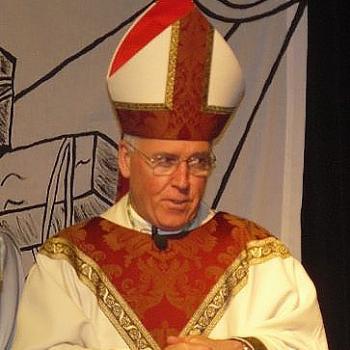Bishop Howard Hubbard of Albany has been writing on the topic, and gotten some feedback from readers, which he shares in his monthly column . It’s unusual for a bishop to turn his attention to this topic — and more unusual, I think, for him to let the people in the pews sound off:
Parishes are meant to be places where people feel a sense of belonging and spiritual kinship; where theology comes alive; where the mysteries of birth, death and resurrection are regularly celebrated; where sacramental moments multiply as mysteriously as the bread and the fishes; where people are being nourished into an earthly image of the Body of Christ.
Yet many find parishes to be clique-ish. An insider crowd can develop, and some may feel that parish ministries are not open to them — especially newcomers, youth and young adults.
Some Catholics relocating from one area to another find it hard to connect and be accepted. Even long-time, active parishioners frequently find themselves being taken for granted, frozen out or ignored.
One woman wrote that she attended Mass regularly and was active in several parish ministries, including the parish’s faith formation program. How-ever, she became disillusioned with the Church’s lack of strong opposition to the war in Iraq and, as a consequence, stopped attending Mass.
What stunned her was that, despite all of her active parish involvement, not one member of the parish staff or any parishioner ever reached out to acknowledge her absence, to ask if anything was wrong or to discuss the reasons for her non-attendance.
Another new parishioner had been attending weekly Mass for some time, yet no one ever welcomed or even spoke to him. One Sunday, he wore a hat and deliberately kept it on throughout the Mass. At one point, the celebrant sent the altar server to ask the usher to instruct the gentleman to remove his hat.
“Thank God,” the man replied to the usher. “I’ve been coming to this parish every week for the past six months, and it’s taken this ploy with the hat to get someone to acknowledge my presence.”
Many long-term parishioners understandably and appropriately treasure their parish roots, even using the term “family.” But surely inclusiveness and hospitality should be high priorities in a parish without an erosion of this cherished identity and connectedness.
PASTORAL INSENSITIVITY
A number of readers mentioned that they or family members have left the Church because of the manner in which they were treated by a priest, deacon or lay representative of the parish.Frequently, this rejection or perception thereof centers around the reception of the sacraments: parents whose child is refused baptism because they are not regular church attendees; couples who are denied marriage because they are not registered parishioners; long-time parishioners in hospitals or nursing homes who become upset when the parish priest does not visit or celebrate with them the sacrament of the anointing of the sick; family members who are angered by the failure of the celebrant at the funeral liturgy to speak personally about the deceased, or by being prohibited from offering a eulogy at the end of the liturgy of Christian burial.
Many times, there are legitimate pastoral or canonical explanations for these sacramental decisions; but, unfortunately, too frequently there is the failure to accept people where they are in their faith understanding and practice, and too little listening, explaining or effort made to find mutually acceptable solutions.
POOR PREACHING/LITURGIES
Some priests and deacons rely too heavily on “canned homilies” or preach on topics unrelated to the Scriptures of the day or to the daily realities of their hearers. Frequently, the music selected does not reinforce the liturgical theme of the Sunday or elicit congregational participation.Effective antidotes to these failings can be homiletic reflection groups conducted earlier in the week where a priest or deacon receives insights from the laity, or a functioning parish liturgy committee which seeks creative ways to enhance the liturgy through art, music and community follow-up — especially by offering opportunities to respond to the needs of the poor and vulnerable.
Unless there is such diligent attention given to preaching and liturgical practice, then — as Cardinal Donald Wuerl of Washington, D.C., notes in his pastoral letter, “Disciples of the Lord: Sharing the Vision” — “the message becomes stale; the vision falters and loses its appeal. The promises seem empty and unconnected to peoples’ lives.”
There’s much more. Check it out.
UPDATE: Link to the full story has now been fixed.











